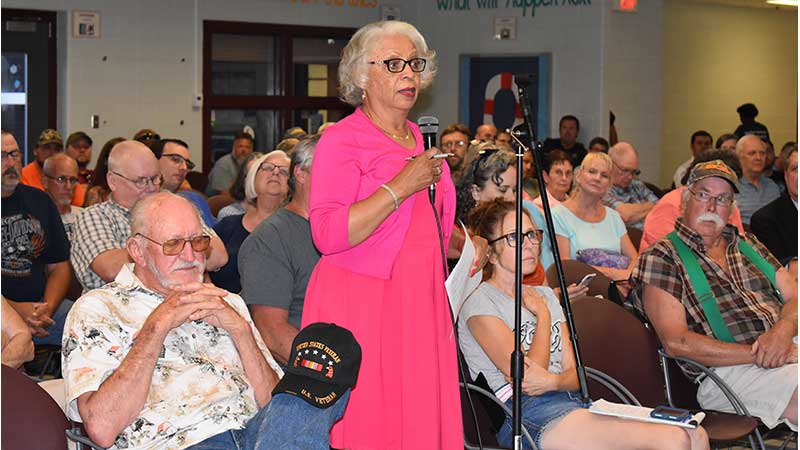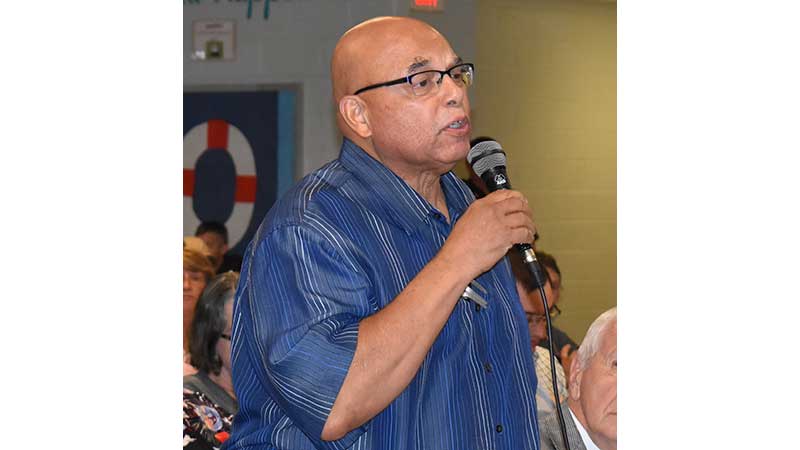Commission votes on landfill Monday
Published 8:08 pm Tuesday, June 19, 2018
Members of the Cumberland County Planning Commission, after two lengthy and tense meetings in which more than 60 members of the public spoke, said they are set to vote on a proposed rezoning and conditional use permit for the Green Ridge facility Monday, June 25.
The June 25 meeting will take place 6:30 p.m. at Cumberland County Elementary School.
The first meeting, held Thursday, saw nearly 30 speakers and allowed members of the planning commission to ask County Waste of Virginia questions following a presentation by the organization.
Darren Coffey, chief executive officer with the Berkley Group, acting as a consultant for Cumberland County, and William Shewmake, attorney from LeClairRyan representing the proposed Green Ridge facility and owner County Waste of Virginia, offered descriptions of the upcoming landfill Thursday.
On Monday, members of the commission commented on the proposed facility. Commission Chairman Dr. William Burger read 19 questions and answers he gathered from audience members and County Waste of Virginia.
About 31 members of the public spoke during the Monday meeting. All members of the public during the Thursday and Monday meeting spoke in opposition to the proposed landfill and recycling center.
When Shewmake rose to speak Monday after commissioners commented, members of the audience walked out, going into the hallway outside of the meeting room.
The hearing Thursday focused on the proposed rezoning (REZ) request, which would span 15 parcels with 14 currently being zoned as Agricultural-2 and a portion of a parcel zoned as Residential-2. The rezoning request would have the parcels be zoned as M-2, which designates a heavy industrial zone.
The hearing for the conditional use permit for the proposed facility was moved to Monday.
The permit, read by Planning and Zoning Director J.P. Duncan, has 39 conditions that include constructing a potential entrance and exit connecting the facility on Route 60 at the facility’s expense; buffers at no less than 200 feet adjacent to properties for residences not owned by the facility or affiliates (this would not apply for properties owned by the facility, Shewmake confirmed), or 300 feet from the nearest residential properties, with 100 foot buffers along other perimeters of landfill property; buffers at no less than 500 feet from any well or spring used for drinking water; groundwater would be monitored in accordance with DEQ regulations; and the conditional use permit will terminate if the landfill does not commence operations within seven years of the proposed landfill becoming final and non-appealable. The conditional use permit would also terminate if the landfill ceases to operate or maintain required state permits for four consecutive years.
County Waste of Virginia representative said they have agreed to prepay the county $400,000 in host fees and up to $2 million in delay/termination fees.
“Perhaps most importantly, County Waste of Virginia needs this landfill to service more than 300,000 of its Central Virginia customers,” the answers read by Burger noted. “It has already purchased several hundred acres and will be purchasing the rest shortly after zoning approval.”
District Four Planning Commission Member Hunter Allen suggested continuing the hearing for the conditional use permit to Monday, noting it would give members of the commission more time to examine the material.
Shewmake noted during the Thursday presentation that the facility held a traffic analysis. The analysis, according to Virginia Department of Transportation representative Paula Jones, was conducted by engineering, design, and consulting firm Davenport, based in Winston-Salem, North Carolina. The study was meant to see if a negative impact of Route 60’s Level of Service (LOS), measured by a letter grade, could be possible from the landfill vehicles.
The current LOS for Route 60 ranges from B to C, with B traffic taking place between noon and 1 p.m. and 9 and 10 p.m. C grade traffic often comes between 7-8 a.m., 5-6 p.m. and 6-7 p.m.
Shewmake said the route expects to keep the same grade even with the presence of the landfill vehicles.
Shewmake noted that the proposed facility would need to meet regulations from its engineering firm and the Virginia Department of Environmental Quality (DEQ).
“We have Draper Aden, who is one of the most respect engineering firms, and they consult with governments in connection with their landfills,” Shewmake said. “There will be exacting standards as part of DEQ. It is thorough. It is exhaustive.” He said a total of $150 million is expected to be invested in the landfill.
Commission members, addressing a sentiment that the proposed facility is a done deal, said they are continuing to look closely at the proposed rezoning and conditional use permit, taking all residents and their concerns into consideration, and aren’t being swayed to vote on any one side.
Addressing questions to Shewmake Monday, District Two Supervisor Stephen Donahue asked how the first objective for the land use policy in the conditional use permit, which stipulates that the proposed facility would maintain existing land use patterns within Cumberland County, could be achieved for a project rezoning the majority of land from agricultural to industrial.
Shewmake said the project would fulfill the county’s comprehensive plan for creating and increasing the county’s tax base.
“This is meeting that objective, and it’s in the area that you would want to have industry,” Shewmake said. “In fact, it’s in the general location of where the previous landfill was rezoned.”
Donahue asked if sums from the $1.3 to $2.7 million annually the county is expected to receive from the facility could be used to assist nearby property owners in the event they have to move or lose property value as a result of the facility. He noted a section of an ordinance that states that some areas of the proposed facility which may create “some nuisance and which are properly associated with nor particularly compatible with residential, institutional or neighborhood commercial service establishments.”
Addressing the audience, Donahue said, “This is a perfect example of what governments do regularly, is they particularize the problem and generalize the benefits. So they say ‘well, it will generally benefit the county,’ … but that doesn’t help the particular persons that are involved that would be hurt … What I would like to do is I would like a way in which our county government considers the particularizing of the problem with reimbursements or compensations, reductions of taxes or something to help those that would be most impacted.”
Shewmake said that would be up to the county board of supervisors to decide. He described the question as a political issue.
Among the questions and answers Burger read, County Waste of Virginia representatives said they would offer to buy property potentially impacted at full market value, and that they would be willing to purchase other properties on a case-by-case basis.
“We’re generally (in a) low-density area, which is where would you want us to be,” Shewmake said. “That’s why the conditions are so important because M-2 is more intense, and that’s why the conditions to recognize that there can be impacts are so important.”
Speakers during both meetings addressed the impact of the facility on nearby homeowners, impact on the historical site adjacent to the facility, Rosenwald-funded Pine Grove Elementary School, and potential health risks. After many of the addresses, members of the audience applauded.
The Rev. Muriel Miller Branch and Jacqueline James, during the Thursday meeting, addressed the close proximity of the proposed facility to Pine Grove Elementary School, a schoolhouse for African-American students built by Julius Rosenwald, philanthropist and president of Sears Roebuck.
James read a letter from Preservation Virginia that noted that the Pine Grove School was one 360 schoolhouses of its kind built in Virginia. Of the 360, it’s likely that less than a quarter of the schools remain intact, the letter noted.
Rosenwald Schools were designated by Preservation Virginia on the 11 Most Endangered Historic Places list.
“While considering the rezoning of the Green Ridge parcel and its conditional use permit, we urge you to weigh the negative impacts this land will have on the historic Pine Grove School,” the letter from Justin Serafin, director of preservation initiatives and engagement from Preservation Virginia read. “Additionally, we urge you to stipulate as many specific conditions as necessary to effectively minimize and mitigate those negative impacts should the rezoning move forward.”
During the Monday meeting, representatives from County Waste of Virginia addressed the concern, saying that the school is located on the other side of the proposed landfill’s operations on Route 654. They said they would partner with the county to help restore the school.
Carson Tucker, chairman of the Powhatan County Board of Supervisors, spoke during the meeting. He noted two foundational elements of Powhatan’s comprehensive plan include education and public safety.
He said concerning the high volume of trucks expected to present if the facility is approved, he said the trucks would present a threat to the county’s public safety.
“Every one of us is daily confronted by the scariness of Route 60,” Tucker said, noting speed, curves, blind spots and reckless actions by motorists as threats. “All of our schools, and all of yours, are either on Route 60 or debouche onto 60. Most of us probably, you too, have had close calls, seen rear-enders, T-bones, accidents of minor and major significance. We all know what happens to traffic flow … We know that the levels of service, especially at peak hours, is deteriorating.”
“We urge you, in the name of public safety, to deny this REZ and this CUP, and we respectfully ask you as good neighbors not to do this to us,” Tucker said.
Powhatan County residents have spoken out, expressing concern about the proposed facility, noting that they nor county administration had been notified about the proposed project, which would send landfill trucks through Route 60, entering Cumberland from Powhatan.
After Tucker’s address, members of the audience gave a standing ovation.
Action has been taken by county residents to create a referendum, which would allow members of the county to vote for the proposed landfill.
William Bruce, a resident heading the process, said he and other residents opposed to the landfill have received between 200 and 300 signatures over Sunday and Monday. He and court clerk Deidre Martin confirmed that Bruce filed a statement of petitioner, and Friday was granted a certificate confirming the court has filed Bruce’s statement and that he can get signatures. When signatures are filed, Martin said he can submit an order asking the judge to allow it to be on the ballot for the upcoming election.
This article has been corrected from its original version.







